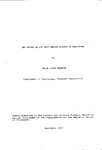AN INVESTIGATION INTO BELIEF BIASES IN REASONING
| dc.contributor.author | BARSTON, JULIE LINDA | |
| dc.contributor.other | School of Psychology | en_US |
| dc.date.accessioned | 2013-09-24T09:00:08Z | |
| dc.date.available | 2013-09-24T09:00:08Z | |
| dc.date.issued | 1986 | |
| dc.identifier | NOT AVAILABLE | en_US |
| dc.identifier.uri | http://hdl.handle.net/10026.1/1906 | |
| dc.description.abstract |
This programme of research investigates the effect of belief bias in syllogistic reasoning. Belief bias is conventionally characterised as a non-logical tendency to accept or reject deductive inferences on the basis of belief rather than logical argument. However, some theorists have argued that the effect is weak compared with that of logic and that it arises from misinterpretation of the premises or failure to accept the logical task. Despite the adoption of control s recommended in the recent literature. Experiments 1 to 3 found consistently strong belief bias effects on the syllogistic evaluation task. However, there were equally strong effects of logic and an interaction between the two factors. Verbal protocol analysis revealed some possible misinterpretation of premises. More strikingly, however, it suggested the presence of three different modes of reasoning which were forward, backward or conclusion based and associated respectively with increasing level s of belief bias. Belief bias was not observed in Experiments 4 and 5 which employed similar problem content on the syllogistic construction task. However, in view of findings recently published by other researchers, it appears that more salient beliefs are needed to produce the effect on this type of task. Experiments 6 to 9 investigated the cause of the logic times belief interaction observed here and in earlier published studies: in essence, the effect of belief is stronger on invalid than valid problems. This could be due to misinterpretation of the logical concept of necessity, but extended instruction on logical interpretation failed to eliminate the effect. The findings were more consistent with a selective scrutiny model of belief bias which claims that arguments supporting unbelievable conclusions are more thoroughly analysed than those supporting believable conclusions. This model is discussed with reference to contemporary theories and findings in the psychology of reasoning. | |
| dc.language.iso | en | en_US |
| dc.publisher | University of Plymouth | en_US |
| dc.title | AN INVESTIGATION INTO BELIEF BIASES IN REASONING | en_US |
| dc.type | Thesis | |
| plymouth.version | Full version | en_US |
| dc.identifier.doi | http://dx.doi.org/10.24382/4747 | |
| dc.identifier.doi | http://dx.doi.org/10.24382/4747 |
Files in this item
This item appears in the following Collection(s)
-
01 Research Theses Main Collection
Research Theses Main


